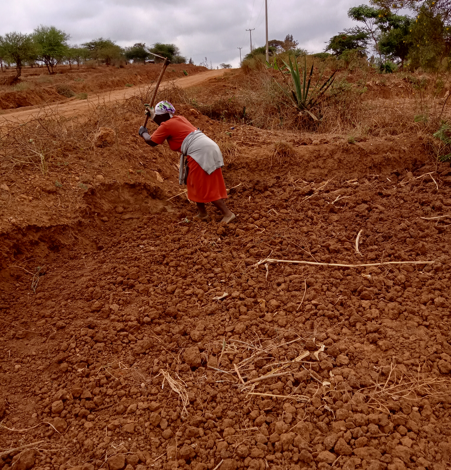Recycling of seeds likely to cost farmers in Machakos as drought prolongs

A section of farmers in Machakos county is worried that they might lack seeds for the next planting season due to the prolonged drought in the region. Their concerns come at a time when the world is marking Africa Day which provides an opportunity to celebrate the socio-economic achievements of the continent.
As this year’s theme focuses on strengthening resilience in nutrition and food security in the continent, the farmers’ only hopes are on the little drought-resistant crops which they did not invest more on.
In an exclusive interview with Parents magazine, one of the farmers who is also an indigenous farming system activist, Peter Nzioka said the long drought is affecting beans and maize which are considered staple crops by residents.
Nzioka says that farmers in the area normally depend on the previous harvests to get seeds for the next planting season and most of them cannot afford to buy seeds and are likely not to plant in the next season, which he says is an alarming signal of food shortage for families and economic purposes in future.
“The seeds we planted have all dried and since we don’t operate seed bank now, we will have planting seed shortage which means that we need to go to the market and the cost is very high,” said Nzioka.
He says only a few farmers in the area who have been planting perennial crops of which some are indigenous seeds like pigeon pea, and red sorghum which have proved to persevere the drought will have some harvests.
“These are the ready crops that we are counting on. Unfortunately, we did not invest well in them compared to beans and maize so they are very few,” he added.
Also read: 4 major ways climate change has affected families in Kenya
In a press statement last month, the International Crops Research Institute for the Semi-Arid Tropics (ICRISAT) advised farmers in Eastern and Southern Africa to consider sorghum and pearl millet hybrid parents as they are drought tolerant.
The statement further stated that these crops address the impacts of climate change on food and nutrition security and that data has shown an increase in their demand in the region for conventional utilization and as new alternatives for commercial use in food, feed malting emerges.
“Private companies in India, South Africa, and Zambia have also expressed interest in investing in hybrid sorghum and pearl millet in East and Southern Africa to tap into the opportunities arising from the rising sorghum and pearl millet grain demand and as an option for climate change mitigation,” reads part of the statement.
According to ICRISAT Director-General, Dr. Jacqueline Hughes, partnership with the government in building resilient agri-food systems has transformed millions of livelihoods economically and nutrition-wise, through the development of hundreds of improved seed varieties and several agricultural technologies for semi-arid areas.
“For a very long time, a huge number of farmers used to recycle seeds but today, there is a notable number that has adopted improved varieties such as millet, sorghum, chickpea, cowpea, and other dryland cereals and legumes,” said Dr. Hughes during the ICRISAT 50th anniversary celebration on 8th last month.
ICRISAT is an international non-profit organization that undertakes scientific crop research for development. It focuses on the drylands and specializes in crops that survive in harsh climates like chickpea, pigeon pea, groundnut, sorghum, pearl millet, and finger millet.
Featured photo: Ruth Kevuva, an organic farmer in Machakos. Photo by Tebby Otieno




